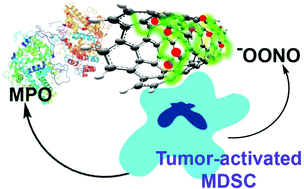Payload drug vs. nanocarrier biodegradation by myeloperoxidase- and peroxynitrite-mediated oxidations: pharmacokinetic implications†
Abstract
With the advancement of nanocarriers for drug delivery into biomedical practice, assessments of drug susceptibility to oxidative degradation by enzymatic mechanisms of inflammatory cells become important. Here, we investigate oxidative degradation of a carbon nanotube-based drug carrier loaded with Doxorubicin. We employed myeloperoxidase-catalysed and peroxynitrite-mediated oxidative conditions to mimic the respiratory burst of neutrophils and macrophages, respectively. In addition, we revealed that the cytostatic and cytotoxic effects of free Doxorubicin, but not nanotube-carried drug, on melanoma and lung carcinoma cell lines were abolished in the presence of tumor-activated myeloid regulatory cells that create unique myeloperoxidase- and peroxynitrite-induced oxidative conditions. Both ex vivo and in vitro studies demonstrate that the nanocarrier protects the drug against oxidative biodegradation.


 Please wait while we load your content...
Please wait while we load your content...